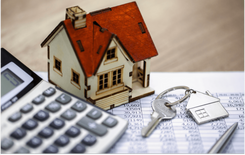Uncovering the Truth: Is Nashville's Real Estate Market a Bubble?


by Tyler Forte
All it takes is a quick home search in Nashville and the surrounding areas to see that house prices are at an all-time high. And if you take a peek back in a week or so, there’s a very good chance those numbers will continue to creep up. So, it’s easy to see why so many people want to know if Nashville’s real estate market is a bubble. And if it is a bubble, when will it burst?
However, before hastily assigning a label to the current state of the real estate market in Nashville, it’s important to fully understand why home prices are rising and how a bubble is actually defined. So, whether you’re wondering if you need to sell, sell, sell or if you should wait to buy, this article is designed to give you a fully informed perspective of the Nashville real estate market.
How Is A Market Bubble Defined?
A market bubble occurs in stages and is mostly characterized by a warp-speed rate of value increases that do not accurately reflect the true underlying value of something. This is followed by an extreme contraction to what the true value should be. The contraction or correction is what is often referred to as a “crash.” This is when the proverbial bubble bursts.
In other words, a market bubble is when an asset’s price begins to become an exaggeration (or deviation) of its true value.
According to Investopedia, a market bubble follows these five steps:
1. Displacement: When investors throw their funds behind a new, innovative, and seemingly radical asset or investment. Often at first, the prices are justified. Tying this concept back to the Nashville real estate market, many out-of-state residents have discovered the benefits that Tennessee has to offer. This realization can be likened to the discovery of a new frontier rich with nice weather, a business-friendly economy, and low taxes.
2. Boom: Prices of the asset begin to slowly increase, then, as more investors catch on, the price begins to take a skyward path. This is when prices begin to deviate from the asset’s true value. Investors stop worrying about the price they are buying the asset at just to be able to own a piece.
3. Euphoria: This stage is noted to be a mania-like mad dash to get in on the investment. This is where the true danger is in a bubble because investors do not heed caution–and they often come up with speculative reasons to justify why prices are so extreme. By the time the market reaches euphoria, the asset’s perceived value is in steep contrast to its justified value.
4. Profit-Taking: This phase occurs when investors begin to suspect their money is invested in an asset that is part of a bubble, so they begin to sell, trying to get out before the burst.
5. Panic: The profit-taking stage is a precursor, often months in advance of the panic phase. In the panic phase, nearly every investor tries to jump ship as prices plummet.
To determine if the housing market in middle Tennessee is in a bubble, we must determine if the increase in prices is justified. However, if there are legitimate forces at play that are causing prices to increase, then it is not a bubble. On the other hand, if prices are increasing solely due to speculation, then it is a market bubble.
How Much Has The Nashville Real Estate Market Gone Up In The Past Five Years?
To determine if the Nashville real estate market is a bubble, we need to recognize whether or not the above stages are occurring. To do so, we can look at the price trends over the past half-decade.
The median price of a home for sale in Nashville in January 2022 was $478,150 with the median price per square foot at $263. In January 2021, the median price of a home in Nashville was $410,000. This is a year-over-year increase of nearly 17%.

As for the past 5 years, the median price of a single-family home in Nashville went from $310,000 in 2017 to the current $478,150. This is a 54% overall increase. While a 54% increase over five years can seem a bit steep, it’s important to keep in mind all the factors that went into that value increase.
The demand for homes during the Covid-19 pandemic skyrocketed due to rock-bottom interest rates, geographically-flexible working conditions (work-from-home), and a strong economy.
PRO TIP: View homes for sale in Nashville
What Are The Fastest-Growing Parts Of Nashville?
The Bourdeaux neighborhood and surrounding area northwest of the Cumberland River (and downtown) has grown the fastest at 18.8%. The small suburb of Pegram, west of Nashville has seen a 15.3% increase in growth.
And the areas of Glencliff to Lenox Village and everywhere in between have grown at a 15.2% rate. These neighborhoods are tucked just south of Nashville and include mostly residential neighborhoods built between the 1960s and 1980s.
How Nashville’s Growth Compares To Other Cities
There’s no doubt that Nashville is growing quickly–a trip to the local grocery store during rush hour is often enough proof for residents that have been here for at least a decade. But how does Nashville’s growth compare to other cities? Here’s how Nashville stacks up:
- Nashville was ranked #14 in 2020 for job growth and wage growth.
- Music City also came in at #8 in best-performing cities by the 2021 Milken City Index.
- Nashville was rated the fourth best place to buy a house by Wallet Hub due to the forecast that the city will continue to grow in popularity.
- The 2020 U.S. Census reported the Nashville suburbs of Murfreesboro and Franklin, Tennessee to be in the top 15 fastest-growing cities in the U.S.
Why Nashville Is Growing So Fast
Nashville is an affordable big city
As you may have noticed based on license plates while driving around town, many people are flocking to Nashville from other states. A lot of new Nashville residents are coming from other parts of the country such as New York, California, Illinois. Why? Compared to places like Chicago and New York City, Nashville is a relatively affordable place to live. This is primarily due to a lower cost for housing, no state income tax, lower property taxes, etc.
Music City jobs keep increasing
In the past couple of years, we've had AllianceBernstein, Amazon, iHeartMedia, and now Oracle announce they are making large-scale moves to the city bringing with them high-paying jobs.
The COVID-19 pandemic has encouraged people to move
Covid has accelerated Nashville's rise as a city since more companies are allowing employees to work from home and as flexible "gig-economy" jobs become more prevalent. Employees who can choose where to work and live will favor a city like Nashville for many of the same reasons outlined above.
Who Is Moving To Nashville?
We’re hearing fewer and fewer native Tennessee accents in and around Nashville. Nashville is seeing its biggest intake from residents moving from the New York metro area followed by Los Angeles, Chicago, San Francisco Bay Area, and Seattle.
PRO TIP: Thinking of moving to Nashville? Check out our comprehensive guide
Does Supply And Demand Play A Role?
Nashville’s housing demand
Ultimately, the demand for Nashville real estate and limited housing supply is real and explains the increase in home prices throughout the city. And the high demand for Nashville homes is likely to continue based on the current migration trends.
In addition to migration and economic trends, historically low mortgage rates have a major hand in the demand for housing. Low-interest rates have pushed buyer demand to an all-time high since low-interest rates mean low mortgage rates, which results in paying a lot less over the life of a home loan.
The most common 30-year mortgage rate was at 2.7% back in January. Since then, the average rate has slowly increased to just above 3%. Which is to say rates are still historically extremely low.
The supply side of things in Nashville
From the demand side of the equation, it makes perfect sense why Nashville real estate has increased in price so quickly but what about the supply side?
Home inventory (or the number of homes currently for sale) is at a historic low. In January 2022, the number of homes for sale in Davidson County was just 1,151 single-family homes, which may sound like a lot. But compared to January 2021 (2,836), it's close to a 60% decrease.
Not only are the number of homes currently on the market significantly lower but the amount of homes being added as new listings each month is historically low as well. In January 2022, there were 601 new listings added to the market which is 38% less than January 2021 (972).
In short, the market reflects the extremely high demand and extremely low supply. The only way the market will 'balance' itself is by pushing prices higher.
Our Final Thoughts
Yes, the Nashville real estate market feels crazy right now. Homes are flying off the market in record time, and it can feel like the market is in flux.
So, is the Nashville housing market in a bubble? No, and here’s why: the value of homes reflects the reality of supply and demand. Prices are high, but that is because there are historically low-interest rates, an all-time high number of people immigrating to the city, and very few homes available for sale. Ultimately, Nashville home prices are high but justified, so, we are not in a speculative investor bubble.
A bubble suggests that it will 'pop' at some point. At Felix Homes, we don't think that will be the case. Nashville has too much going for it and it's likely demand for Nashville real estate will stay strong for many years to come.
About Felix Homes
Felix Homes is where five-star service meets low commissions! To date, we've saved our clients $1,610,738 in commission fees and have earned 120 five-star reviews on Google!
How are we able to offer five-star service AND lower commission fees? It's simple:
- We're an independently owned brokerage – not a franchise which allows us to keep more of the commission we earn.
- By offering a lower commission, more folks want to work with us which means we close more deals. By closing more deals, we can pass more savings along to our customers!
Still not convinced? Read all about our low-commission mission here.
If you have any questions about the state of the market or the home buying/selling process, please feel free to contact us at contact@felixhomes.com or 615-354-5731.




